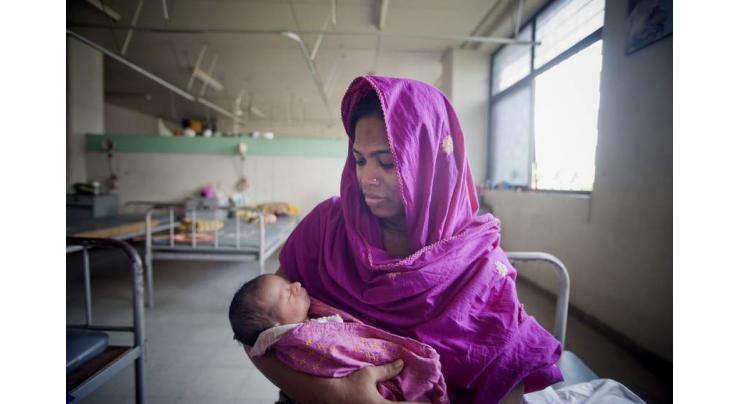
Maternal Health Services Expansion To Save Precious Lives: Report
Umer Jamshaid Published September 03, 2019 | 05:12 PM

A joint report of Population Council and GuttMacher Institute on Tuesday revealed that additional funding for provision of maternal health services and modern contraceptive care will save precious lives in the country
ISLAMABAD, (UrduPoint / Pakistan Point News - 3rd Sep, 2019) :A joint report of Population Council and GuttMacher Institute on Tuesday revealed that additional funding for provision of maternal health services and modern contraceptive care will save precious lives in the country.
The report, which launched here with titled "Adding It Up: Costs and Benefits of Meeting the Contraceptive and Maternal and Newborn Health Needs of Women in Pakistan'' said that expanding both modern contraceptive services and maternal and newborn care would maximize benefits to women.
New estimates revealed critical gaps in reproductive health services for women of reproductive age (15�49) in Pakistan.
The new report examined the current needs for contraceptive services for married women and for maternal and newborn health care for all women of reproductive age, quantifies the health benefits of investing in these services, and provides estimates of the cost of fully meeting these needs.
It said that currently, about half of the 16.8 million married women in Pakistan who want no more children or want to postpone having a child for at least two years are not using a modern contraceptive method.
Addressing the launching ceremony Special Assistant to Prime Minister on National Health Services, Dr Zafar Mirza reiterated government's commitment to population welfare.
He stressed the need of sustainable population growth as any economic growth in the country will be diffused because of the high level of population growth.
Dr Mirza, said that this study has been released at a very appropriate time and provides strong research-based evidence of how much additional money Pakistan needs for mother and child healthcare and contraceptive care that will guide the government to increase funding in these areas.
This study will be helpful in policymaking, allocation of funds and initiation of a constructive dialogue to overcome issues posed by unprecedented population growth, he added.
According to report, providing modern contraception to all married women in Pakistan who need it would yield large benefits. Compared with 2017 levels, increased contraceptive services alone would result in 3.
1 million fewer unintended pregnancies (82% decline), 2.1 million fewer induced abortions (82% decline) and nearly 1,000 fewer maternal deaths (9% decline).
It claimed that the current cost of providing modern contraceptive services in Pakistan is $81 million per year. Expanding those services to cover all married women with an unmet need for modern contraception would cost an estimated $173 million annually, it added.
It said that importantly, simultaneous investment in meeting the needs for modern contraception and maternal and newborn health care would cost less compared with focusing on maternal and newborn health care alone�reducing the cost of maternal and newborn care to $1.65 billion from $1.89 billion.
Each additional Dollar spent on expanding modern contraceptive use would save more than $2.50 on maternal and newborn health care, it added.
Zeba Sathar, Country Director at the Population Council's Pakistan office and a coauthor of the report said, "This study provides robust evidence that makes the investment case for additional financing for family planning services in Pakistan.
She said that investing more in contraceptive care, especially within the public health system, will produce a much-needed boost in meeting both family planning and maternal health goal will support the 2018 Council of Common Interests recommendations on family planning, and lead to overall savings by reducing the additional costs of unintended pregnancies.
"Comprehensive strategies to improve reproductive health care are vital for ensuring the well-being of women and their families," said Susheela Singh, Vice President for International Research at the GuttMacher Institute.
"Fully meeting the need of modern contraception while simultaneously providing high-quality maternal and newborn health care to all who need it should be prioritized."The authors recommend engaging stakeholders including provincial governments, the Federal government, the private sector and international development partners in fulfilling the demand for modern contraceptive care and in fully meeting the need for maternal and newborn care.
Related Topics
Recent Stories

Pakistan, Japan agrees to convene 'Economic Policy Dialogue'

FM Dar conveys deepest sympathy on torrential rains devastation in UAE

Spain PM Sanchez says weighing resignation after wife's graft probe

Tennis: ATP/WTA Madrid Open results - 1st update

Long-lost Klimt portrait auctioned off for 30 mn euros

Osaka seals first win on clay since 2022 in Madrid

Earthquake jolts Karachi

Sindh minister orders operation after attack on police in Ghotki

TikTok to fight US ban law in courts

Anger among Ukrainians in Poland as Kyiv halts passport renewals

Police book youngster for abusing student for one year

British-Pakistani firm unveils $35 million luxury apartments for overseas Pakist ..
More Stories From Health
-

Vaccines save at least 154 million lives in 50 years: WHO
5 hours ago -

UHS to issue MBBS degrees within three months after final result
8 hours ago -

Rawalpindi woman gives birth to six babies
5 days ago -

DC calls for intensive anti-polio drive in ICT
6 days ago -

World Hemophilia Day observed to underscore importance of providing comprehensive care
7 days ago -

Six in a family with heart on the 'right side'
7 days ago
-

Diabetic disease increasing rapidly : Dr. Noor Elahi Memon
7 days ago -

World Hemophilia Day observed
7 days ago -

ATC dismisses bail petition of doctor involved in illegal kidneys transplant
15 days ago -

Dr. Shehzad warns against deviation from WHO guidelines on anti-smoking
15 days ago -

Health activists express concerns over attempts to derail tobacco control
17 days ago -

UHS declares MBBS first prof, MS urology exam results
26 days ago











